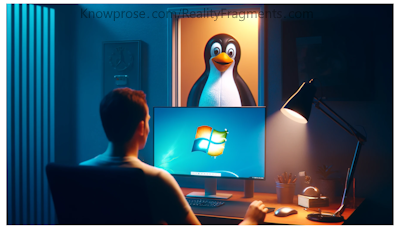
Microsoft Recall has been making waves in privacy circles. Some are calling it a privacy nightmare, some others are calling it a privacy nightmare, and privacy experts are sounding the alarm about it1.
As usual, when Microsoft does a stupid – and in my eyes, this is a pretty big stupid – people talk about migrating to Linux. Of course, people still think that people who use Linux wear funny hats and shout incantations at monitors through their keyboards to make it work. It’s not true. Well, not that true. To date, no Linux user has summoned Cthulu, though there are corners where there is concern about that. Those are silly corners.
Around the Fediverse, Linux users are being admonished to be on their best behavior, but I think that stereotype of bearded Linux users shouting at newbies to ‘RTFM!’ is a bit dated.
Linux has become more friendly. It’s become so friendly, in fact, that some who are long term users eschew the fancy GUIs for the tried and trusty command lines, but you don’t need to.
Linux is easy, and no, you don’t have to abandon your documents, or your way of life. A few things will change, though.
You won’t need the latest hardware to run an operating system – which means more money for beer and pizza, or wine and pizza, or whatever and whatever. You can breathe old life into that old computer system that you don’t want to leak arsenic into your water table and use it some more.
Linux-Curious?
If you are an academic, Robert W. Gehl has some Linux tips for you – he’s been using Linux in academia since 2008, on ‘Microsoft campuses’.
He hits some of the high notes for just about everyone, and I’ll only add that the Linux-on-a-stick and Linux User Groups are good ways to get your feet wet and help with the transition.
The trouble is you have so many options with distributions, and so many people have strong opinions on which distribution is better.
Spoiler alert: They all work. Start somewhere. Distributions are just flavors of Linux.
I suggest Ubuntu since it has oodles of support. I myself have different distributions I use for different things, but I’m a long time Linux user and have gotten to know my own preferences along the lines of Debian Linux, but I use Ubuntu as well. In time you will, or you won’t.
Linux-on-a-stick is a great way to check your hardware to see what issues might have with Linux as far as drivers. Since this article is written for Windows users, I’ll point to using Rufus to create a bootable USB Ubuntu Linux stick. You can put other distributions on a stick in the same way, too, so you’re not just stuck with one type of Linux.
If you want human help, search your area for a local Linux User Group. If you’re not sure where to start, here are some ways to find out if there is a Linux User Group near you. Failing that, ask for help on social media platforms.
The key to moving to Linux isn’t that you don’t know the answers. It’s that sometimes you might ask the wrong questions because of what you’re used to. If you think about it, that’s true of everything.
Grab a USB stick and see if your PC will run Linux so you can put the ‘personal’ back in ‘personal computer’.
- You have to admit, the idea of a privacy expert making noise seems peculiar. You’d think privacy experts would be like ninjas – so private you don’t even know about them. They must be more interested in your privacy. ↩︎